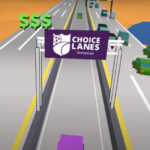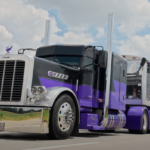Residents and city leaders in Charlotte, North Carolina, are advocating for stricter enforcement of truck parking regulations, aiming to address safety concerns and enhance the city’s appearance. However, finding viable solutions to the pervasive issue has proven elusive for officials, creating a challenging scenario.
The demand for truck parking in Charlotte exceeds the available capacity, particularly at the convergence of Interstate 85 and Interstate 77 in Mecklenburg County, which is identified as one of the nation’s busiest spots for truck parking, according to Axios Charlotte. The city is grappling with the consequences of this imbalance.
Presently, the City of Charlotte Code Enforcement and the Charlotte Department of Transportation are taking a primarily educational approach by distributing informational flyers to semi-truck owners parked illegally on city streets. Despite these efforts, the city recently implemented a significant increase in parking fines, raising them from $25 to $100. This adjustment positions Charlotte with the highest parking fines in North Carolina, signaling a commitment to addressing the issue more assertively.
“That’s a deterrent, if it’s enforced,” said Charlotte Resident Antoinette Mingo of the newly raised fines.
“It [illegal truck parking] makes our community look terrible,” Mingo said. “But even more than that, we don’t want an accident to happen, and somebody is killed and a family is impacted, before something is done.”
The North Carolina Department of Transportation (NCDOT) has taken steps to address the issue of illegal truck parking along the Interstate 485 ramp to North Tyron Street. Warning signs have been strategically placed in this area, which is a notorious hotspot for unauthorized truck parking. However, truckers seem to have adapted to this measure by opting to park just around the corner on Tyron Street instead. Despite the warning signs, the problem persists, prompting the need for more comprehensive solutions to effectively deter illegal parking behavior.
“You got to try and find where you can make parking,” said Vindal Ogletree, a trucker of 20 years. “It’s hard out here. You’re in a no-win situation.”
Reacting to the ongoing situation, concerned citizens have come together to establish a “Quality-of-Life Team” with the primary objective of enhancing the well-being of residents. Their initial focus centers on addressing the challenges associated with truck parking and littering in the area. One major area of contention for the team is the perceived lax enforcement of truck parking laws by the State Highway Patrol. The team is actively seeking ways to advocate for more stringent enforcement measures to alleviate the impact of unauthorized truck parking on the community’s quality of life.
“The folks that are enforcing that understand the legal dynamic that a driver’s in,” said Ben Greenberg, president and CEO of the North Carolina Trucking Association. “They’ve got a federally mandated maximum amount of time that they could drive, but they don’t have a federally guaranteed safe place to park.”
“We recognize the needs of the truck drivers and the commercial vehicle drivers, but we have to consider the residents’ safety first,” said Renee Johnson, the council representative for the University City area.
Within the group, there are varying opinions on how to address the issue. Some members advocate for implementing strict measures such as booting, towing, and impounding trucks belonging to drivers who flout parking regulations. However, opposing views argue that such punitive actions might not effectively solve the problem and could potentially impose hardships on the drivers themselves.
An alternative proposal involves the idea of opening up nearby rest areas and weigh stations for truck parking. Despite this suggestion, the North Carolina Department of Transportation (NCDOT) has not expressed any intentions to pursue such plans. Additionally, the challenge of obtaining approval for industrial zoning in Charlotte complicates the establishment of private truck parking facilities.
Presently, City Council members are emphasizing the need for robust enforcement against illegal truck parking. Nevertheless, Mayor Braxton Winston advises caution, expressing concerns about potential overreach. He suggests seeking insights from other cities to collaboratively devise a practical and effective solution to the problem.
“We should be leaders on the national level,” he said.





